|
|
|
Sort Order |
|
|
|
Items / Page
|
|
|
|
|
|
|
| Srl | Item |
| 1 |
ID:
156083
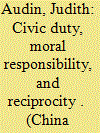

|
|
|
|
|
| Summary/Abstract |
This paper, which is based on ethnographic field research, analyses the system of resident-volunteers in the neighbourhoods of Beijing. Between co-optation networks, surveillance missions, ritualised practices, and ordinary exchanges of sociability amongst neighbours, volunteering is an interesting form of citizen participation in urban China. The volunteer networks are made up of inhabitants who are selected and involved through the norms of civic duty, personal acquaintance, moral obligation, or persuasion, in order to contribute to the production of local public order. Finally, this specific form of voluntarism reveals, from the perspective of retired people, how shared socio-political practices are created and perpetuated within an institutional volunteering system.
|
|
|
|
|
|
|
|
|
|
|
|
|
|
|
|
| 2 |
ID:
139095
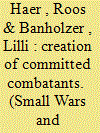

|
|
|
|
|
| Summary/Abstract |
Theories on conflict behaviour regard armed groups as unitary actors whose members faithfully execute the orders of their leaders. Nevertheless, in reality mutinies, insubordination and fractionalisation occur. We argue that the faithful execution of orders depends on the level of organisational commitment of combatants. This level can be increased with the help of four management strategies. Using a dataset based on fieldwork in the Democratic Republic of the Congo, we analyse the influence of each of these strategies. The Bayesian analyses show that recruitment, training and promotion has statistical reliable influence, but that providing rewards does not.
|
|
|
|
|
|
|
|
|
|
|
|
|
|
|
|
| 3 |
ID:
166353


|
|
|
|
|
| Summary/Abstract |
The expansion of intermittent renewable power poses new challenges: Balancing fluctuations in power supply and demand requires additional flexibility. In this work, we model a unit commitment optimization problem to investigate the economic feasibility of concepts for flexible power generation from biogas. Because the economics of flexible power generation also depend on the availability of other flexibility options, we compared flexible biogas plants in power markets with different characteristics, namely Germany, northern Italy, and the islands of Sardinia and Sicily.
|
|
|
|
|
|
|
|
|
|
|
|
|
|
|
|
| 4 |
ID:
141301
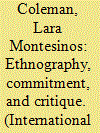

|
|
|
|
|
| Summary/Abstract |
This article addresses the vexed question of relations between critique and political struggle. As emphasis upon the “impact” of research increases, possibilities of integrating research into practices of resistance have been highlighted. Such approaches lend themselves to ethnographic methods, with scholars engaged in these ways offering nuanced reflections on possibilities of “bridging gaps” between research and solidarity. Here, however, I draw on over a decade of “activist” ethnography to highlight risks of conceptual enclosure associated with this move. The politics of struggle are quickly erased through available categories and problematics, which are readily absorbed into existing constellations of power. By contrast, the gaps between solidarity and writing provide spaces for emergence of a critical attitude—along lines sketched by Foucault. Nevertheless, to “apply” Foucault to this sort of ethnography carries a risk of betrayal. Foucault's critical ethos can be neither starting point nor end of engagement with actually existing struggles. Inspired by the philosophical tradition in which Foucault's work was rooted, I advocate a practice that gives weight to ontologies emerging from struggle as conjectures perpetually in question. This implies not closing gaps but a persistent back-and-forth between critique and commitment—risking ourselves as subjects at both ends.
|
|
|
|
|
|
|
|
|
|
|
|
|
|
|
|
| 5 |
ID:
124968


|
|
|
|
|
| Publication |
2013.
|
| Summary/Abstract |
This commentary discusses a set of essays, arguing that each examines a demand for the extraction or 'excorporation' of organic form to supplement a lack elsewhere, whether the apperception of that lack be located in the clinic, in national or regional politics, or in big data as databases come to promise the ground of inclusion and future life. Reading through and across the essays, it proposes a conceptual vocabulary rooted in a figure of 'commitment' or the 'given over', this given over opposed to an analytics of the gift. The argument is made that the body emerges as a ground for thought and action in its being given over to another, in its commitment. An analytics of commitment addresses the relation of parts and wholes in our attending to practices of excorporation and designations of sacrifice.
|
|
|
|
|
|
|
|
|
|
|
|
|
|
|
|
| 6 |
ID:
117016


|
|
|
|
|
| Publication |
2012.
|
| Summary/Abstract |
Leadership turnover may produce significant foreign policy changes when leaders differ from their predecessors in their preferences over the resort to war and when they cannot commit to implement inherited policies. How, then, does the expected behavior of an incumbent leader's successor affect crisis bargaining in the present? I analyze a leader-centric model of crisis bargaining in which (a) the distributive outcomes of crises affect political survival, (b) leadership turnover implies the accession of a new leader with potentially different preferences, and (c) successors can renegotiate inherited settlements. In equilibrium, the sensitivity of an incumbent's political survival to making concessions interacts with the resolve of the successor to affect both the terms of settlement and the occurrence of war. First, political survival incentives can lead an incumbent to demand more than her adversary is willing to concede, provoking war when the successor is of similar resolve. Second, when a politically sensitive incumbent will be followed by a resolute successor, her adversary may grant otherwise unnecessary concessions to bolster the relatively irresolute incumbent in office. Finally, when a politically sensitive incumbent will be followed by an irresolute successor, her adversary may attack in order to depose the incumbent, hastening her replacement to secure better bargains in the future. Predictions about the present balance of resolve and leaders' survival incentives may thus be fundamentally altered in light of the future balance of resolve.
|
|
|
|
|
|
|
|
|
|
|
|
|
|
|
|
| 7 |
ID:
117522
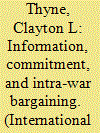

|
|
|
|
|
| Publication |
2012.
|
| Summary/Abstract |
This article considers how governmental variations affect the duration of civil conflicts. Recent work suggests that war termination is likely when competing actors gain information about the power balance and are able to credibly commit to war-ending agreements. I focus on how the strength and stability of executives impact these factors. Regarding information, power consolidation within the government reduces the number of people who must agree on a settlement, which should shorten civil conflicts. Stable leadership should likewise shorten conflicts by making it harder for potential spoilers to derail war-ending agreements, helping minimize credibility problems. This argument is tested by examining how variations in institutional design (executive constitutional and legislative power), political strength (ideological fragmentation and polarization), and stability (leadership tenure) affect the duration of civil conflicts from 1946 to 2004. The results suggest that powerful and stable executives are indeed well equipped to end civil conflicts.
|
|
|
|
|
|
|
|
|
|
|
|
|
|
|
|
| 8 |
ID:
148150
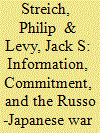

|
|
|
|
|
| Summary/Abstract |
We apply a modified version of the bargaining model of war to the outbreak of the Russo-Japanese War of 1904–1905. We conceptualize the informational path to war as a two-step process, the first identifying the sources of informational asymmetries, and the second specifying the causal linkages between informational asymmetries and war. The sources of informational asymmetries include not only private information and incentives to misrepresent that information, but also individual, societal, and governmental-level factors. We argue that the primary causes of the Russo-Japanese War involved a combination of the commitment problem and preventive logic arising from Russia's growing power relative to that of Japan, and informational problems arising from disagreements about relative power and resolve. These disagreements arose almost exclusively from Russian political and military leaders' underestimation of Japanese capabilities and resolve, and they generated highly intransigent Russian bargaining behavior. Russia misperceptions can be traced primarily to racial and cultural stereotypes and psychological biases, and to competition between rival domestic and bureaucratic factions that distorted information flows, created an incoherent decision-making process, and sent confusing signals to Japan.
|
|
|
|
|
|
|
|
|
|
|
|
|
|
|
|
| 9 |
ID:
140438


|
|
|
|
|
| Summary/Abstract |
Within the interdisciplinary literature on cosmopolitanism, one particularly important distinction stands out as a recurring motif. Specifically, scholars have been concerned to distinguish between cosmopolitanism as a set of mundane practices and/or competences on the one hand and cosmopolitanism as a cultivated form of consciousness or moral aspiration on the other. For anthropologists, this distinction between aspiration and practice is often rendered ambiguous across the diverse expressions of cosmopolitanism that they encounter ‘on the ground’. This special issue therefore brings together five contributions from anthropologists who are reporting on encounters and aspirations that reveal different forms of spatial mobility, scales of commitment or risk, and are often transient, ambivalent and precarious. These are circumstances in which cosmopolitanism emerges as uneven and partial rather than as a comprehensive or unequivocal transformation of practice and outlook.
|
|
|
|
|
|
|
|
|
|
|
|
|
|
|
|
| 10 |
ID:
172309


|
|
|
|
|
| Summary/Abstract |
This essay raises the question whether citizens in the digital age can learn from how credibility is treated in international negotiations. Negotiators face problems both in attempting to send credible signals and in making credibility assessments of received signals. Several studies, starting with Schelling’s seminal analysis of commitments, indicate that credible signals are those that are somehow costly to the sender. Contributions to our understanding of how recipients make credibility assessments include Jervis’s distinction between signals (with no inherent credibility) and indices (believed to be untainted by deception). The most general conclusion emerging from existing research is that there is no definitive, infallible solution to the problem of credibility, insofar as deception and misperception are intrinsic to all signaling systems. Today’s unfortunate combination of limited awareness of credibility problems, on the one hand, and technological advances facilitating deception, on the other, calls for intensified education as well as multidisciplinary research.
|
|
|
|
|
|
|
|
|
|
|
|
|
|
|
|
| 11 |
ID:
150995
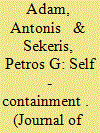

|
|
|
|
|
| Summary/Abstract |
In anarchic settings, potential rivals can be dragged into arms races degenerating in open wars out of mutual suspicion. We propose a novel commitment device for contestants to avoid both arming and fighting. We assume that the military decides the armament levels of a country, while the civilian decides whether to attack a rival country. When these decision-making bodies perfectly communicate, the decision makers are unable to credibly communicate to their foe their willingness not to arm and not to attack, thus implying that war ensues. With imperfect information, however, peace may ensue as countries credibly signal to their rival a more peaceful stance since contestants are more reluctant to enter in an armed confrontation with a potentially understaffed army. Using data on the 1975 to 2001 period, we provide supportive evidence that in countries where the head of the state or the defense minister are military officers, and are therefore better informed of their armies’ fighting preparedness, the likelihood of observing an international conflict is higher.
|
|
|
|
|
|
|
|
|
|
|
|
|
|
|
|
| 12 |
ID:
165983


|
|
|
|
|
| Summary/Abstract |
This study investigates how territorial acquisition through war affects the durability of a successive ceasefire and determines what type of territorial acquisition is more detrimental to post-war peace. Despite the wealth of literature on recurrent war and on territory, the effect of territorial acquisition on war resumption has been understudied. This study shows that territorial acquisition creates expectations among adversaries for future power shifts, which results in a commitment problem that hinders peaceful revision of the existing ceasefire. Indeed, duration analysis of ceasefires following interstate wars since World War II shows that territorial change in war, especially acquisition of large and densely populated territories that have potential utility for greater power shifts, makes ceasefires more prone to failure. The analysis of Sino-Vietnamese ceasefires following militarized incidents over land and sea borders also illustrates the importance of territorial acquisition and the potential utility of the territory.
|
|
|
|
|
|
|
|
|
|
|
|
|
|
|
|
| 13 |
ID:
184736


|
|
|
|
|
| Summary/Abstract |
Since the 1951 establishment of the Syrian Writer’s Collective and the consequent consolidation of the doctrine of socialist realism, modern Syrian literature has been defining its own parameters as an autonomous entity that nonetheless is committed to social and political critique. After 1967, the inward turn of Syrian intellectuals resulted in a more militant equation of the literary field with doctrinal socialist realism. But there was a counternarrative in other cultural work such as that of the Syrian playwright Saʿdallah Wannous (1941–97) who in the 1960s began publishing short one-act plays inspired by Brechtian aesthetics of alienation. As a form, drama was less familiar to his audience and Wannous admits in Bayanat li Masrah ʿArabi Jadid (1988) that in this phase he was writing with no conception of an audience. This article examines Waanous’s aesthetic of alienation in relation to his manifestos and critical writings on the nahḍa or Arab renaissance of the late 19th, early 20th centuries. I then compare his dramatic aesthetic to contemporary Lebanese visual artist Rabih Mroué’s (b. 1967) work. I examine Mroué’s theatrical and video works in conjunction with his manifestos. Like Wannous, Mroué engages perpetrator and victim, drawing attention to the violence implicit in representation. In comparing both playwrights’ use of violence and relationships to previous articulations of realism, I focus on the reimagined position of the spectator and how it extends (not discontinues) earlier debates on committed art.
|
|
|
|
|
|
|
|
|
|
|
|
|
|
|
|
| 14 |
ID:
134156


|
|
|
|
|
| Publication |
2014.
|
| Summary/Abstract |
Although research on violent extremism traditionally focuses on why individuals become involved in terrorism, recent efforts have started to tackle the question of why individuals leave terrorist groups. Research on terrorist disengagement, however, remains conceptually and theoretically underdeveloped. In an effort to enhance our understanding of disengagement from terrorism and pave the way for future empirical work, this article provides a multidisciplinary review of related research from psychology, sociology, and criminology. Significant promise for moving beyond the existing push/pull framework is found in Rusbult and colleagues' investment model from psychology and Ebaugh's research on voluntary role exit from sociology. Rusbult's investment model offers insight into when and why individuals disengage from terrorism, while accounting for individual, group, and macro-level differences in the satisfaction one derives from involvement, the investments incurred, and the alternatives available. Ebaugh's research on voluntary role exit provides a deeper understanding of how people leave, including the emotions and cuing behavior likely to be involved. The article highlights the strengths and limitations of these frameworks in explaining exit and exit processes across a variety of social roles, including potentially the terrorist role, and lends additional insights into terrorist disengagement through a review of related research on desistance from crime, disaffiliation from new religious movements, and turnover in traditional work organizations.
|
|
|
|
|
|
|
|
|
|
|
|
|
|
|
|
| 15 |
ID:
174835


|
|
|
|
|
| Summary/Abstract |
Motivation is a key factor for the military institution to accomplish its goals. Extant academic research, however, has generally focused on the combat motivation and the motivation to serve has been understudied. This study examines the motivation to serve and its predictors among Turkish military officers and NCOs. The aim of the current study is 2-fold: (1) to test the effectiveness of measures proposed by previous studies in Turkish Armed Forces and (2) to build on the existing body of knowledge by showing the impacts of perceived fairness and satisfaction with social benefits. Survey data, which were conducted only 2 months before the coup attempt in Turkey on July 15, 2016, were used to assess the motivation. Findings revealed that institutional and moral commitments, organizational responsiveness, perceived fairness, and satisfaction with social benefits were positive significant determinants of motivation to serve, while occupational commitment had a negative relationship with it.
|
|
|
|
|
|
|
|
|
|
|
|
|
|
|
|
| 16 |
ID:
123539
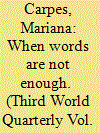

|
|
|
|
|
| Publication |
2013.
|
| Summary/Abstract |
This paper seeks to assess whether there is a contradiction between the commitment to non-proliferation declared by Brazil;India and South Africa and their domestic nuclear choices. Despite differences in their international nuclear status;these countries share similar commitments to non-proliferation;at least discursively. However;once the domestic level-more specifically;the historical characteristics of each of these countries' nuclear paths-is taken into account;a contradiction between their international discourse and their national interests seems to arise. By analysing their nuclear history;this paper asks the following questions: how much have these countries actually been doing in terms of non-proliferation? What are the aims of these countries' domestic nuclear politics? Is there any contradiction between their international nuclear discourse and their domestic practices?
|
|
|
|
|
|
|
|
|
|
|
|
|
|
|
|
| 17 |
ID:
151864


|
|
|
|
|
| Summary/Abstract |
In That Smell and Notes from Prison, Sonallah Ibrahim engages literary and feminist discourses in his political narrative against the Nasserist regime and the culture of commitment (iltizam) of the 1960s. Ibrahim's antihero is a newly released writer who is faced with the challenges of overcoming his failure to connect with women and society, and find a motivation to write. He realizes that most readers, writers and critics are not in favour of his literature of exposé, which refuses to depict or treat the ugly reality as a beautiful one. In foreshadowing the 1967 defeat and the impotence of Arabs, That Smell and Notes from Prison warns of a prolonged cultural and literary decay should political corruption override basic human and women's rights in the Arab world.
|
|
|
|
|
|
|
|
|
|
|
|
|
|
|
|
|
|
|
|
|